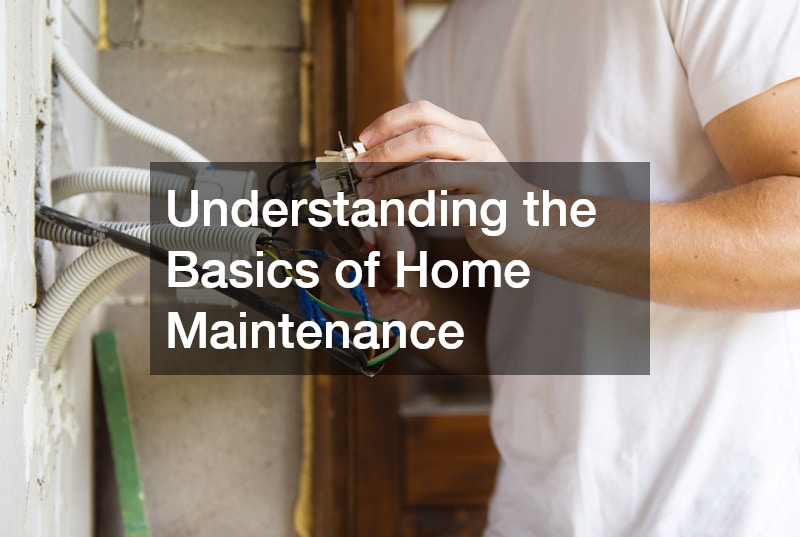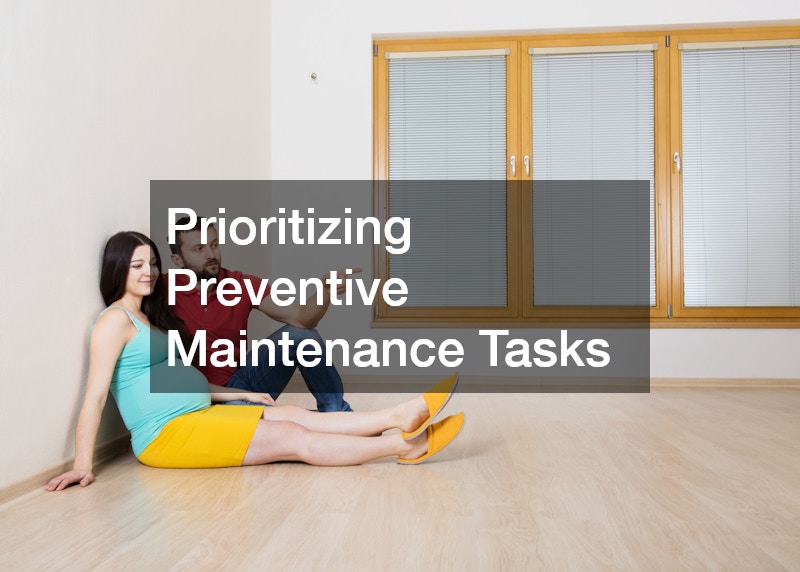- Planning Your Maintenance Routine
- Understanding the Basics of Home Maintenance
- Creating a Seasonal Maintenance Checklist
- Prioritizing Preventive Maintenance Tasks
- Scheduling Regular Inspections for Key Systems
- Budgeting for Routine and Emergency Repairs
- Addressing Common Issues Before They Escalate
- Choosing Reliable Professionals for Maintenance Needs
- Incorporating Energy Efficiency Into Maintenance Plans
- Using Technology to Streamline Home Maintenance
- Planning Long-Term Upgrades for Home Value Preservation
- Implementing New Maintenance Strategies
Planning Your Maintenance Routine
Maintaining a home is a continuous process that ensures its safety, efficiency, and overall value. A structured approach, such as following comprehensive home maintenance plans, helps homeowners address essential tasks while minimizing unexpected issues. Regular maintenance not only preserves the appearance and functionality of your home but also reduces the likelihood of costly repairs. By proactively caring for each aspect of your property, you create a living environment that supports your comfort and long-term goals. From basic upkeep to larger, seasonal projects, having a plan allows you to prioritize tasks and stay organized.
Home maintenance plans also promote a healthier and more sustainable living space. They encourage you to anticipate your home’s needs rather than react to problems as they arise. These plans cover everything from routine cleaning and minor repairs to energy efficiency improvements and structural inspections. A well-crafted plan provides a clear roadmap, helping you allocate resources wisely and make informed decisions at every step. With a proactive approach, you can catch small issues before they escalate, saving both time and money.
Additionally, home maintenance plans empower homeowners to integrate modern technologies and long-term upgrades into their strategies. From leveraging smart devices to partnering with reliable professionals, the tools available today make it easier than ever to manage home care effectively. They also ensure your home evolves to meet your changing needs and lifestyle. Whether addressing plumbing concerns, maintaining outdoor spaces, or enhancing energy efficiency, a comprehensive maintenance plan is the key to preserving and improving the place you call home. With the right mindset and resources, home maintenance can be a rewarding investment in your property’s future.

Understanding the Basics of Home Maintenance
Home maintenance starts with understanding the essential tasks that keep your property in good working order. These basics often include tasks like cleaning, inspecting, and repairing components throughout the home. Maintaining systems such as plumbing, electrical wiring, and heating ensures they function efficiently and safely. Regular attention to these elements helps you identify potential problems early and take corrective action before they become larger issues. Home maintenance plans provide a framework for organizing these responsibilities, helping you stay on top of what needs to be done while reducing the risk of surprises.
One critical example is scheduling a drain cleaning service as part of your routine maintenance. Clogged or slow drains can disrupt your daily activities and potentially lead to more significant plumbing problems. By having your drains professionally cleaned, you prevent blockages, maintain water flow, and extend the lifespan of your plumbing system. Including drain cleaning in your home maintenance plan ensures that your plumbing operates smoothly, saving time and avoiding costly emergency repairs.
Creating a Seasonal Maintenance Checklist
Every season brings its own set of maintenance requirements, making a seasonal checklist an invaluable tool for homeowners. By breaking tasks into quarterly or seasonal categories, you can address weather-specific concerns and protect your home from seasonal wear and tear. Home maintenance plans that incorporate seasonal checklists ensure that critical tasks like cleaning gutters, sealing windows, or winterizing outdoor systems are completed on schedule. This approach not only streamlines your efforts but also prevents small issues from escalating into larger problems.
For instance, hiring a gutter cleaning business in the fall is essential to remove leaves and debris that accumulate during the season. Blocked gutters can lead to water overflow, damaging your roof and foundation. Regular gutter cleaning ensures proper drainage, protecting your home from leaks and structural issues. Including this task in your seasonal maintenance plan keeps your home safe and functional throughout the year, regardless of the challenges each season may bring.

Prioritizing Preventive Maintenance Tasks
Preventive maintenance is one of the most effective ways to protect your home from costly repairs and unexpected breakdowns. By addressing potential issues before they escalate, you ensure that your home remains safe, functional, and comfortable. Preventive maintenance involves tasks such as inspecting systems, replacing worn components, and cleaning areas prone to wear and tear. Incorporating preventive measures into your home maintenance plans reduces the likelihood of emergencies, saving both time and money in the long run. A proactive approach also helps extend the lifespan of your home’s systems and appliances.
One important example of preventive maintenance is scheduling a pest control service to protect your home from potential infestations. Pests like termites, rodents, and ants can cause significant structural damage if not addressed promptly. Regular inspections by a professional pest control service help identify early signs of infestations and implement measures to prevent them. By including pest control in your home maintenance plan, you can safeguard your property and maintain a healthy living environment.
Scheduling Regular Inspections for Key Systems
Routine inspections are a cornerstone of effective home maintenance, allowing homeowners to identify and address issues before they become serious. Key systems such as plumbing, electrical wiring, roofing, and HVAC units require periodic evaluations to ensure they operate safely and efficiently. Scheduling regular inspections as part of your home maintenance plans ensures that these critical components remain in good condition, reducing the risk of costly repairs or failures. Inspections also provide peace of mind, as they help uncover hidden problems that might otherwise go unnoticed.
For instance, scheduling roofing maintenance can prevent extensive damage caused by leaks or weather-related wear. Professional inspections help identify issues like missing shingles, clogged gutters, or weakened flashing, all of which can compromise your roof’s integrity. Regular roofing maintenance not only protects your home from water damage but also extends the lifespan of your roof. Including roofing inspections in your home maintenance plan ensures that your home remains secure and protected from the elements.

Budgeting for Routine and Emergency Repairs
A well-planned budget is essential for managing home maintenance effectively. Allocating funds for both routine tasks and unexpected repairs ensures you are financially prepared to address issues as they arise. Home maintenance plans that incorporate a budgeting element allow homeowners to prioritize tasks without overspending. By setting aside resources for regular upkeep and emergencies, you can prevent financial stress while keeping your home in top condition.
An example of this approach is including septic cleaning in your maintenance plan. Septic systems require periodic cleaning to prevent backups and costly repairs. Neglecting this task can lead to environmental hazards and damage to your property. By budgeting for septic cleaning as part of your home maintenance plan, you ensure that this essential system continues to function efficiently, avoiding emergencies and preserving your home’s value.
Addressing Common Issues Before They Escalate
Many home maintenance problems start as minor issues that can quickly grow into costly repairs if not addressed promptly. Tasks like fixing small leaks, repairing cracked walls, or replacing worn-out seals are easy to overlook but essential to maintaining the integrity of your home. Home maintenance plans that include regular checks for these common problems help homeowners catch and resolve them early. Taking a proactive approach not only prevents damage but also reduces stress and saves money in the long term.
For instance, working with a remediation company is critical when addressing water damage or mold issues. A small water leak, if left unattended, can lead to structural damage and health concerns caused by mold growth. Remediation professionals can assess the extent of the issue and provide tailored solutions to restore your home’s safety and condition. Including this step in your home maintenance plan ensures that small problems are handled before they escalate into more serious concerns.

Choosing Reliable Professionals for Maintenance Needs
Not all home maintenance tasks are suitable for DIY efforts. For complex systems or tasks that require specialized expertise, hiring reliable professionals is essential. From plumbing and electrical work to structural repairs, skilled technicians ensure that maintenance is done correctly and safely. Home maintenance plans that include a list of trusted professionals make it easier to address specific needs promptly, saving time and preventing errors. By relying on experts, homeowners can maintain their properties with confidence.
For example, partnering with a plumbing contractor for routine inspections and repairs is a smart investment. Whether it’s fixing a leaky pipe, installing new fixtures, or ensuring your water heater is in good condition, a professional plumber brings the experience and tools necessary to handle the job efficiently. Incorporating plumbing services into your home maintenance plan keeps your systems running smoothly and minimizes the risk of unexpected failures.
Incorporating Energy Efficiency Into Maintenance Plans
Energy efficiency is a vital component of modern home maintenance. Improving your home’s energy performance not only reduces utility costs but also contributes to environmental sustainability. Home maintenance plans that prioritize energy-saving measures help homeowners identify opportunities for upgrades and improvements, such as better insulation, efficient appliances, or weatherproofing. These efforts result in a home that operates more efficiently and is better equipped to handle seasonal changes.
One key strategy for energy efficiency is scheduling regular maintenance or upgrades for local generator repair. A well-maintained generator ensures reliable power during outages and operates at peak efficiency, reducing fuel consumption and emissions. Whether it’s routine servicing or replacing worn-out parts, addressing your generator’s needs as part of your home maintenance plan keeps your home prepared for emergencies while minimizing energy waste.
Using Technology to Streamline Home Maintenance
Technology has transformed the way homeowners manage their properties, making it easier to stay on top of routine maintenance and unexpected repairs. From mobile apps that track tasks and send reminders to smart home devices that monitor systems in real time, technology offers a range of tools to simplify home care. Incorporating these solutions into your home maintenance plans can improve organization and efficiency, ensuring that no important tasks are overlooked. Technology also provides peace of mind by automating processes and alerting you to potential issues before they escalate.
For example, custom shower doors equipped with smart features like water temperature monitors or anti-fogging technology enhance both convenience and efficiency. These modern upgrades not only elevate the look and functionality of your bathroom but also reduce the need for frequent maintenance. Including smart home devices like these in your maintenance plan ensures your home is both modern and easy to manage.
Planning Long-Term Upgrades for Home Value Preservation
A successful home maintenance plan doesn’t just focus on immediate tasks but also incorporates long-term upgrades that enhance property value and functionality. Planning for improvements, such as updating outdated appliances, renovating high-use areas, or enhancing curb appeal, ensures your home remains competitive in the market. By spreading out these upgrades over time, you can manage costs effectively while continuously improving your home. Home maintenance plans that prioritize value-adding upgrades also allow you to stay ahead of wear and tear, ensuring your property remains in excellent condition.
For instance, partnering with a paving company to upgrade your driveway or pathways can significantly boost your home’s curb appeal and durability. A well-maintained driveway not only improves aesthetics but also enhances safety and functionality. Including such upgrades in your home maintenance plan allows you to preserve and even increase your home’s value over the long term.
Implementing New Maintenance Strategies
An effective home maintenance plan is essential for keeping your property safe, efficient, and valuable. By combining routine tasks, preventive measures, and long-term upgrades, you create a structured approach that minimizes unexpected issues and reduces overall costs. Home maintenance plans provide the organization and foresight needed to address the unique needs of your home, from seasonal tasks to emergency repairs. This comprehensive strategy ensures your home remains a comfortable and functional living environment for years to come.
By leveraging the expertise of professionals such as plumbing contractors or remediation companies, and incorporating modern technology like smart devices, you can streamline your efforts and achieve higher efficiency. Long-term upgrades, like those completed by paving companies or energy efficiency improvements, ensure that your home evolves with your lifestyle while retaining its market appeal. A well-thought-out home maintenance plan not only protects your investment but also enhances your day-to-day living experience. With the right tools, resources, and mindset, home maintenance becomes less of a chore and more of an opportunity to create a better home for yourself and your family.
